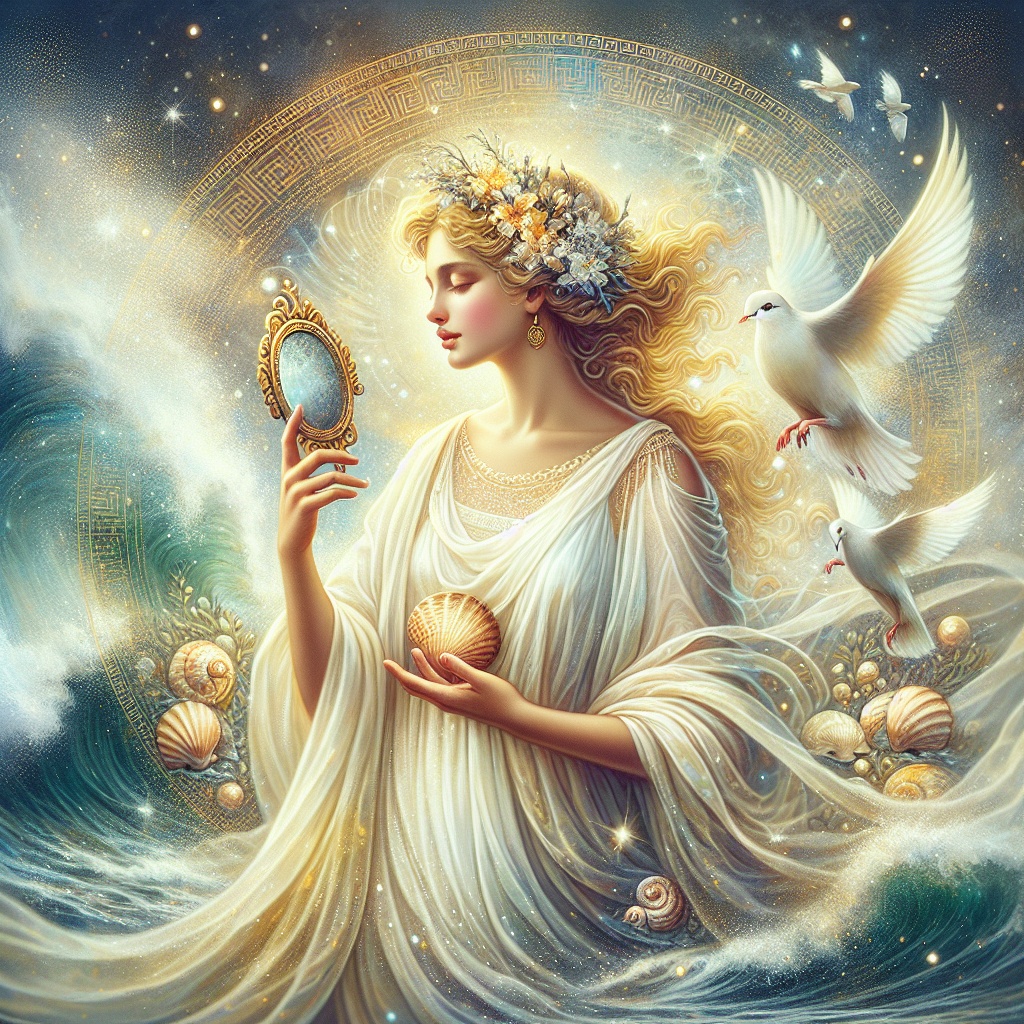Greek mythology is filled with complex characters who navigate love, loss, and the sometimes brutal whims of the gods. One such character is Phaedra, a woman whose tragic story has inspired art and literature for centuries. This blog post breaks down her life, myths, and the themes that make her story unforgettable.
Jump to:
Recommended for you!
Best SellersWho Was Phaedra?
Phaedra was a prominent figure in Greek mythology, known for her dramatic and tragic tale. She was the daughter of Minos, the King of Crete, and Pasiphaë, a powerful sorceress. This lineage made Phaedra the sister of Ariadne and the half-sister of the fearsome Minotaur, a monster born from Pasiphaë’s unnatural union with a bull.
What Does the Name Phaedra Mean?
The name Phaedra means “bright” or “shining” in Greek. It’s an ironic twist, as her story is filled with darkness and despair. This name meaning serves as a reminder of the contrast between her radiant ancestry and her tragic end.
The Story of Phaedra and Hippolytus

Phaedra is most famous for her doomed love affair with Hippolytus, which is central to her myth. Her story is filled with themes of unrequited love, manipulation, and the devastating effects of the gods' influence.
Phaedra became the wife of Theseus, the legendary hero and King of Athens, making her a queen. Yet, her life was far from peaceful. The goddess Aphrodite, who is known for meddling in the affairs of mortals, had a hand in Phaedra’s suffering. She cursed Phaedra to fall desperately in love with Hippolytus, Theseus’s son from a previous marriage. Why would a goddess do such a thing? Aphrodite was enraged at Hippolytus for rejecting her worship and choosing to honour Artemis, the goddess of chastity and the hunt, instead.
Phaedra’s love for Hippolytus was unnatural and consuming, leading her to struggle deeply with guilt and shame. She confided in her nurse, who, against Phaedra’s wishes, revealed her feelings to Hippolytus. Disgusted, Hippolytus rejected her advances. In her despair and humiliation, Phaedra accused him of attempting to assault her, setting off a tragic chain of events.
The Consequences of Phaedra’s Lies
Phaedra’s false accusation led Theseus to curse his own son. Using one of the three wishes granted to him by Poseidon, Theseus called down a curse on Hippolytus, resulting in the young man’s death. Only after this did Phaedra confess the truth, overcome with guilt, and take her own life. The myth of Phaedra and Hippolytus has been retold in many forms, highlighting the devastating impact of unbridled desire, deception, and divine manipulation.
Themes and Messages

So, what is the message of Phaedra’s story? The tale explores the destructive power of forbidden love and the devastating influence of the gods. Phaedra is often viewed as a tragic character, torn apart by forces beyond her control.
The myth also addresses themes of honour, guilt, and the complexity of human emotions. It raises important questions: Who is truly to blame for the tragedy? Is it Phaedra, driven by Aphrodite’s curse, or Hippolytus, for his scornful rejection of the goddess?
Was Phaedra a Victim or a Villain?
Phaedra’s actions and motivations are complicated, which makes her both a sympathetic and a controversial figure. On one hand, she is a victim of Aphrodite’s wrath. The goddess’s curse left her with feelings she neither wanted nor could control. On the other hand, Phaedra’s choices—especially her false accusation of Hippolytus—have fatal consequences. This duality makes her a nuanced character in Greek mythology, illustrating how humans are often caught in the crossfire of the gods' conflicts.
Phaedra’s Symbolism and Representation

In a way, Phaedra symbolises the human struggle against overwhelming emotions and divine influence. She represents the peril of desires that conflict with social norms and personal values. Her story also touches on the idea of women’s roles and vulnerabilities in a patriarchal society. As the wife of Theseus, she had little power, and her only means of influencing events led to disastrous results.
Phaedra in Art and Literature
Phaedra’s tale has inspired many works of art and literature, from ancient plays to modern retellings. One of the most famous adaptations is Hippolytus by Euripides, where the playwright emphasises Phaedra’s inner turmoil and the destructive impact of her passion. Jean Racine’s Phèdre also offers a dramatic interpretation of her story, focusing on themes of honour, duty, and the destructive power of desire.
Recommended for you!
Best SellersFrequently Asked Questions About Phaedra in Greek Mythology
What Happened to Phaedra and Ariadne?
Phaedra and her sister Ariadne both faced tragic fates, although their stories diverge significantly. Ariadne helped Theseus navigate the Labyrinth and defeat the Minotaur, only to be abandoned by him on the island of Naxos. She later found happiness with the god Dionysus.
In contrast, Phaedra’s story ended in heartbreak and death. Despite their shared royal heritage, the sisters experienced vastly different outcomes, reflecting the unpredictability of life in Greek mythology.
Why Is Phaedra a Tragic Hero?
Phaedra fits the definition of a tragic hero because she is a character of noble birth whose downfall is brought about by a combination of personal weakness and the interference of the gods. Her story evokes both pity and fear, as she grapples with emotions that ultimately lead to her ruin. Her struggle against overwhelming passion and her eventual confession add depth to her character, making her story a powerful exploration of human vulnerability.
Did Phaedra genuinely love Theseus?
While Phaedra was married to Theseus, there is little evidence in the myths to suggest she had deep, romantic feelings for him. Her most consuming emotion was the forced and unnatural love she felt for Hippolytus, which was a result of Aphrodite’s curse. Phaedra’s feelings towards Theseus are not explored in great detail, but her loyalty to him was undoubtedly tested by the turmoil she experienced.
Was Phaedra ever portrayed sympathetically in ancient stories?
In many versions of her myth, Phaedra is portrayed as a sympathetic character. Her internal struggle and the immense guilt she feels make her relatable and tragic. While her actions lead to devastating consequences, her suffering and the fact that she was manipulated by the gods make her a complex and pitiable figure.
How did Greek audiences respond to the story of Phaedra?
Greek audiences would have been familiar with the themes of divine interference and human frailty present in Phaedra’s story. Her tale evokes both pity and horror, common reactions to Greek tragedies. The character of Phaedra would have reminded audiences of the ever-present influence of the gods and the dangers of human passions.
How has Phaedra’s story influenced modern literature and theatre?
Phaedra’s story has inspired numerous adaptations and retellings in literature and theatre. Playwrights like Euripides and Racine have explored her character in works such as Hippolytus and Phèdre. Her story continues to be a powerful narrative about human vulnerability, passion, and the consequences of divine wrath, influencing works in both classical and modern drama.
Who encourages Phaedra in her illicit desire for Hippolytus?
Phaedra’s nurse plays a key role in her struggle with her forbidden feelings. The nurse, though well-meaning, reveals Phaedra’s love for Hippolytus, believing that this confession might alleviate her suffering. Instead, this revelation leads to disastrous consequences for everyone involved.
What is the significance of Phaedra’s confession at the end of the myth?
Phaedra’s confession is a pivotal moment that highlights her deep sense of guilt and responsibility. By admitting the truth about her false accusation against Hippolytus, Phaedra takes ownership of her actions, though it is too late to undo the damage caused. Her confession adds to the tragic weight of the story, highlighting themes of honour and the devastating effects of lies.
Study Greek Mythology for £29
Phaedra’s story is just one of many captivating tales in Greek mythology, full of complex characters and dramatic twists. If you’d like to learn more about these myths and explore the characters, symbols, and stories that have shaped Western culture, consider enrolling in the Greek Mythology Diploma Course with Centre of Excellence. For a limited time, you can access the course at a discounted price of £29!













